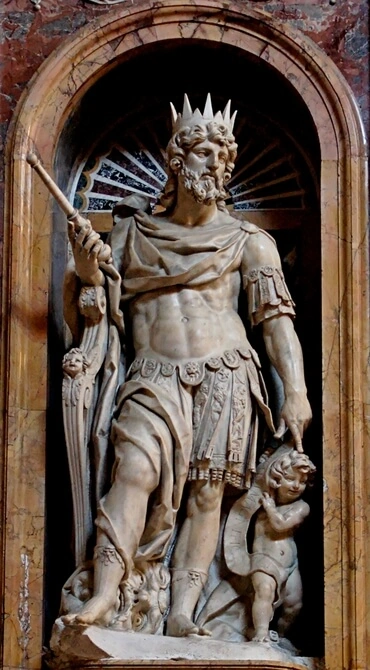1
Allora tutte le tribù d’Israele vennero a trovare Davide a Hebron, e gli dissero: "Ecco, noi siamo tue ossa e tua carne.
2
Già in passato, quando Saul regnava su noi, eri tu quel che guidavi e riconducevi Israele; e l’Eterno t’ha detto: Tu pascerai il mio popolo d’Israele, tu sarai il principe d’Israele".
3
Così tutti gli anziani d’Israele vennero dal re a Hebron, e il re Davide fece alleanza con loro a Hebron in presenza dell’Eterno; ed essi unsero Davide come re d’Israele.
4
Davide avea trent’anni quando cominciò a regnare, e regnò quarant’anni.
5
A Hebron regnò su Giuda sette anni e sei mesi; e a Gerusalemme regnò trentatre anni su tutto Israele e Giuda.
6
Or il re con la sua gente si mosse verso Gerusalemme contro i Gebusei, che abitavano quel paese. Questi dissero a Davide: "Tu non entrerai qua; giacché i ciechi e gli zoppi te ne respingeranno!"; volendo dire: "Davide non c’entrerà mai".
7
Ma Davide prese la fortezza di Sion, che è la città di Davide.
8
E Davide disse in quel giorno: "Chiunque batterà i Gebusei giungendo fino al canale, e respingerà gli zoppi ed i ciechi che sono odiati da Davide…" Donde il detto: "Il cieco e lo zoppo non entreranno nella Casa".
9
E Davide abitò nella fortezza e la chiamò "la città di Davide"; e vi fece attorno delle costruzioni cominciando da Millo, e nell’interno.
10
Davide andava diventando sempre più grande, e l’Eterno, l’Iddio degli eserciti, era con lui.
11
E Hiram, re di Tiro, inviò a Davide de’ messi, del legname di cedro, dei legnaiuoli e dei muratori, i quali edificarono una casa a Davide.
12
Allora Davide riconobbe che l’Eterno lo stabiliva saldamente come re d’Israele e rendeva grande il regno di lui per amore del suo popolo d’Israele.
13
Davide si prese ancora delle concubine e delle mogli di Gerusalemme quando fu quivi giunto da Hebron, e gli nacquero altri figliuoli e altre figliuole.
14
Questi sono i nomi dei figliuoli che gli nacquero a Gerusalemme: Shammua, Shobab, Nathan, Salomone,
15
Ibhar, Elishua, Nefeg, Jafia,
16
Elishama, Eliada, Elifelet.
17
Or quando i Filistei ebbero udito che Davide era stato unto re d’Israele, saliron tutti in cerca di lui. E Davide, saputolo, scese alla fortezza.
18
I Filistei giunsero e si sparsero nella valle dei Refaim.
19
Allora Davide consultò l’Eterno, dicendo: "Salirò io contro i Filistei? Me li darai tu nelle mani?" l’Eterno rispose a Davide: "Sali; poiché certamente io darò i Filistei nelle tue mani".
20
Davide dunque si portò a Baal-Peratsim, dove li sconfisse, e disse: "L’Eterno ha disperso i miei nemici dinanzi a me come si disperge l’acqua". Perciò pose nome a quel luogo: Baal-Peratsim.
21
I Filistei lasciaron quivi i loro idoli, e Davide e la sua gente li portaron via.
22
I Filistei saliron poi di nuovo e si sparsero nella valle dei Refaim.
23
E Davide consultò l’Eterno, il quale disse: "Non salire; gira alle loro spalle, e giungerai su loro dirimpetto ai Gelsi.
24
E quando udrai un rumor di passi tra le vette de’ gelsi, lanciati subito all’attacco, perché allora l’Eterno marcerà alla tua testa per sconfiggere l’esercito dei Filistei".
25
Davide fece così come l’Eterno gli avea comandato, e sconfisse i Filistei da Gheba fino a Ghezer.







